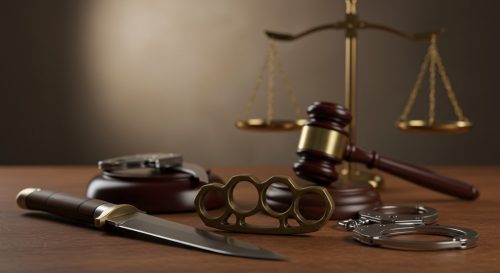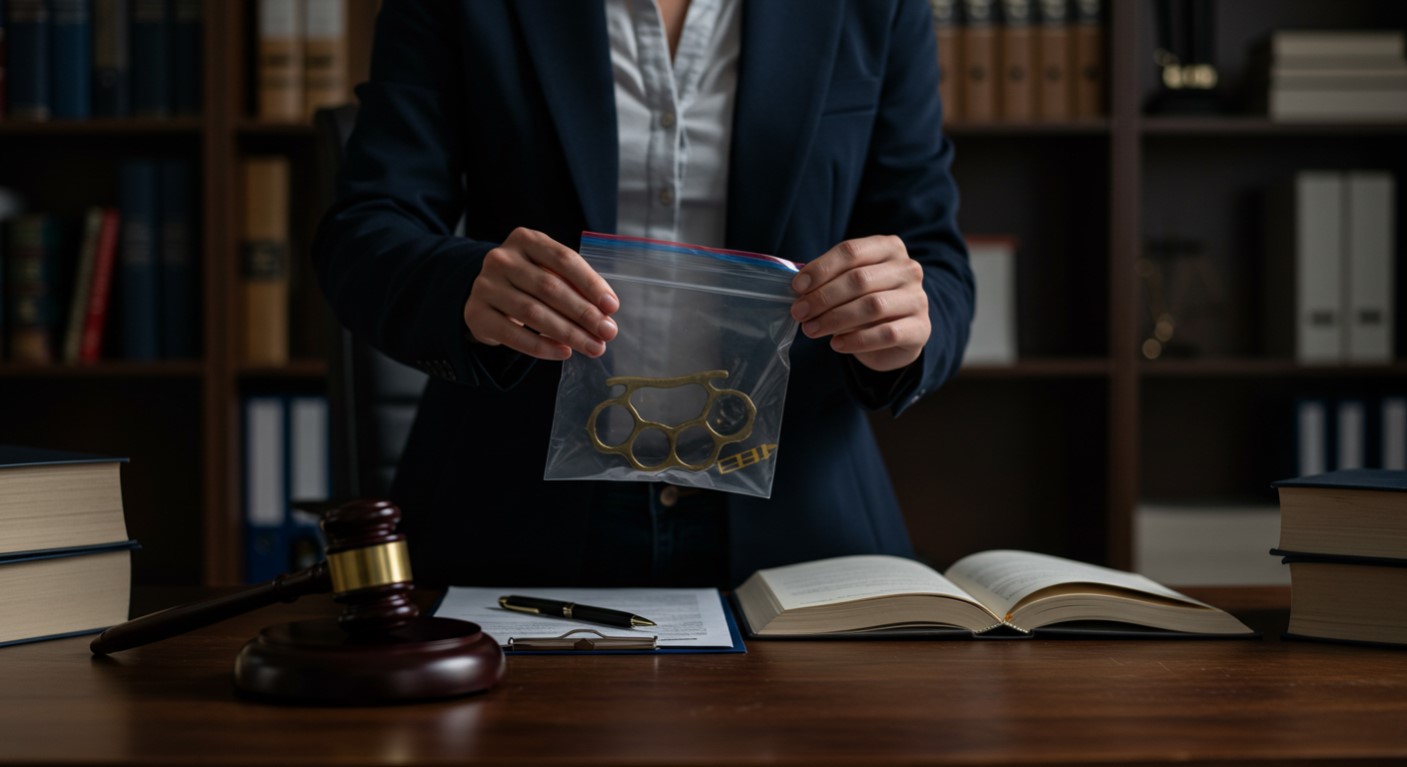Navigating the Legal Landscape of Possessing Offensive Weapons in Private Places in England: Consequences and Legal Defence

Navigating the Legal Landscape of Possessing Offensive Weapons in Private Places in England: Consequences and Legal Defence
The legal landscape surrounding possessing offensive weapons in private places in England is multifaceted and rigorous. It is essential to comprehend the intricacies of these laws, as even within the confines of private property, individuals must adhere to stringent regulations.
This comprehensive guide aims to shed light on the legal framework governing the possession of offensive weapons in private settings, elucidate the potential legal consequences, and underscore the paramount importance of securing legal counsel when confronting such matters.
The Legal Definition of an Offensive Weapon in a Private Place

In legal terms, an offensive weapon is broadly defined as any item that is manufactured, adapted, or intended for causing physical harm. This encompassing definition extends its reach to include a diverse array of objects that could potentially be repurposed for harmful intent.
It is crucial to recognise that the law extends its jurisdiction into private domains, which implies that individuals may come under legal scrutiny for possessing such items within their residences or other private settings. Therefore, understanding the expansive scope of this definition is pivotal in grasping the legal implications.
Legal Framework Governing Offensive Weapons in Private Places
- Prevention of Crime Act 1953: Although primarily concerned with public possession, this act’s implications extend into the realm of transporting weapons to or from private premises. It highlights the significance of how weapons are managed during transitions between private and public spaces. Additionally, it is important to note that this act classifies certain weapons as offensive by default, regardless of the specific context.
- The Criminal Justice Act 1988: This act primarily addresses the possession of knives and other sharply pointed articles in public areas. However, it contains provisions that could potentially be applied within private contexts, especially when there is evidence of an intent to use these items beyond the boundaries of private premises. Understanding these legislative acts is crucial for comprehending the intricacies of weapon possession laws within private places.
Consequences of Illegal Possession of an Offensive Weapon in a Private Place

- Criminal Charges: Offences related to the possession of offensive weapons can vary widely, ranging from simple possession to more severe charges like possession with intent to commit a crime. The specific charges brought against an individual depend on several factors, including the type of weapon and the circumstances surrounding its possession.
- Custodial Sentences: For individuals found guilty of more serious offences, custodial sentences, including imprisonment, are a realistic possibility. This underscores the severity of such charges and the potential loss of freedom associated with them.
- Criminal Record: A conviction in a case involving offensive weapon possession results in a permanent criminal record. This record can have far-reaching consequences, affecting one’s future employment prospects, travel opportunities, and social standing. It is imperative to recognise the enduring impact of a criminal record.
The Role of a Solicitor in Cases of Offensive Weapon Possession
- Expert Legal Advice: Solicitors who specialise in criminal law possess a deep understanding of the nuances of weapon legislation. They can provide individuals with expert advice on the legal implications of possessing offensive weapons within private spaces, helping clients navigate complex legal terrain.
- Representation: Solicitors play a pivotal role in ensuring that individuals facing police inquiries or court proceedings are properly represented. They safeguard their clients’ rights and interests throughout the legal process, advocating for fair treatment.
- Defence Strategy: Solicitors develop effective defence strategies tailored to the specifics of each case. These strategies may involve challenging the weapon’s classification, intent of possession, or the circumstances of its discovery, thereby enhancing the client’s chances of a favourable outcome.
- Mitigation: Skilled solicitors are adept at arguing for mitigated sentences or alternative penalties, particularly in cases where it is challenging to conclusively establish a direct intent to cause harm. Their expertise can result in more lenient sentencing and alternative resolutions.
Conclusion: Final Thoughts on Possessing Offensive Weapons in Private Places

Possessing an offensive weapon within a private location in England is fraught with legal complexities and severe consequences. It is incumbent upon individuals to gain a comprehensive understanding of the law and its application in these circumstances.
Seeking the expertise of a solicitor is not merely a legal defence measure; it also provides a means to navigate this intricate legal landscape effectively, with the aim of securing the most favourable outcome within the boundaries of the law.
Legal counsel is an invaluable asset when confronting the gravity of offensive weapon possession charges in private places.
Notice: Informational Content Disclaimer
The content provided on this website, including articles, blog posts, and other informational materials, is intended for general informational purposes only. It is not intended as, and should not be considered, legal advice.
Visitors to this website should be aware that the information presented here is not a substitute for seeking legal advice from a qualified solicitor or legal professional. Each individual's legal situation is unique, and the information provided may not be applicable to specific circumstances.
If you require legal advice or have specific legal questions, we encourage you to contact us directly. Our experienced team of solicitors is here to assist you with your legal needs and provide tailored advice to address your concerns.
Please be advised that any communication through this website, including the use of contact forms or email, does not create a solicitor-client relationship. Confidential or time-sensitive information should not be sent through this website. To establish a solicitor-client relationship and discuss your legal matters in detail, please contact us for a consultation.
We strive to provide accurate and up-to-date information, but we make no representations or warranties regarding the accuracy, completeness, or suitability of the information contained on this website. We shall not be liable for any reliance placed on the information provided herein.
Thank you for visiting our website. We look forward to the opportunity to assist you with your legal needs.




